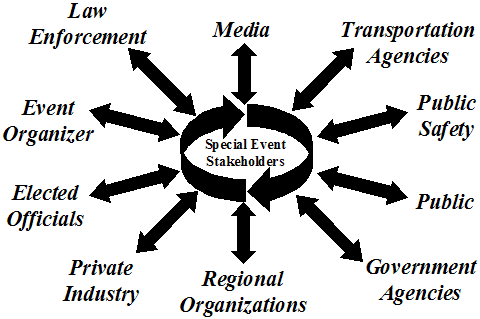
Managing Travel for Planned Special Events
Fact Sheet
November 2003
FHWA Report No.: FHWA-OP-04-034
EDL No.: 13904
Planned Special Events
A planned special event is a public activity with a scheduled time, location and duration that may impact the normal operation of the surface transportation system due to increased travel demand and/or reduced capacity attributed to event staging.
Planned special events include sporting events, concerts, festivals, and conventions occurring at permanent multi-use venues (e.g., arenas, stadiums, racetracks, fairgrounds, amphitheaters, convention centers). They also include less frequent public events such as parades, fireworks displays, bicycle races, sporting games, motorcycle rallies, seasonal festivals, and milestone celebrations at temporary venues.
The operational characteristics of planned special events create the following five event categories:
- Discrete/recurring event at a permanent venue
- Continuous event
- Street use event
- Regional/multi-venue event
- Rural event
What is Managing Travel for Planned Special Events?
Planned special events can significantly impact travel safety, mobility, and travel time reliability across all surface transportation modes and roadway facilities. Managing travel for planned special events involves advanced operations planning, stakeholder coordination and partnerships, developing a multi-agency transportation management plan, raising awareness of general public and event patrons of potential travel impacts, and coordinating agency services and resource sharing.
The practice of managing travel for planned special events targets the following objectives:
- Establish innovative stakeholder partnerships that provide continuous coordination, cooperation, and personnel and equipment resource sharing.
- Adopt procedures and protocols to improve advance planning and day-of-event operations.
- Mitigate potential travel impacts to non-attendee road users and the community at-large.
- Apply new technologies to minimize field personnel requirements, improve travel conditions monitoring, and reduce congestion.
- Influence the utility of all travel choices through transit and travel demand management initiatives and traveler information dissemination.
- Facilitate sound traffic management team organization and communication on day-of-event.
- Integrate evaluation results into regional planning activities for future planned special events.
The goals of managing travel for planned special events are:
- Achieving predictability
- Ensuring safety
- Maximizing efficiency
- Meeting public & event patron expectations
Issues and Challenges
Planned special events pose a unique and diverse set of challenges to stakeholders charged with maintaining transportation system safety, mobility, and reliability. These challenges include:
- Mitigate impacts of event-generated traffic
- Potential for heavy volume of transit vehicles and pedestrian flows
- Coordinate travel management activities with event operator and overall planning team
- Available staff resources and support services
- Infrastructure lacking at event site to:
- Accommodate generated traffic
- Manage traffic
- Provide support services
Meeting these challenges involve initiatives such as:
- Advanced operations planning, stakeholder coordination, and partnerships
- Multi-agency traffic management team:
- Develops traffic management plan
- Prepares procedures and protocol
- Day-of-event traffic control and coordination
- Raise awareness of general public and event patrons of potential travel impacts
- Coordinate agency services and resource sharing
Benefits
The proactive management of travel for planned special events yields numerous benefits to stakeholders and transportation system operations, including:
- Reduce traffic congestion
- Improve mobility
- Improve travel safety
- Form partnerships and build trust
- Promote interagency coordination, resource utilization and sharing
- Incorporate new procedures, plans, and practices into day-to-day operation of agencies
Regional Planning and Coordination
Regional planning and coordination concerns proactively improving travel management for all planned special events in a region. Key initiatives and activities include:
- Interagency agreements
- Regional or consistent agency permit process
- Recommended travel management practices for specific categories of planned special events
- Technical teams formed to champion and carryout specific initiatives
- Assess and report on benefits of regional and event-specific activities
Regional planning and coordination initiatives facilitate more effective and efficient event-specific planning and operations for future planned special events.
Event-Specific Travel Management
The practice of managing travel for planned special events incorporates advance planning, management, and evaluation activities encompassing five distinct, chronological phases:
- Program planning encompasses advance planning activities completed months prior to a single, target event or activities related to a series of future planned special events.
- Event operations planning involves advance planning and resource coordination activities conducted for a specific planned special event.
- Implementation activities concern strategizing traffic management plan deployment in addition to conducting necessary equipment testing and personnel training activities.
- Day-of-event activities refer to the daily implementation of the traffic management plan in addition to traffic monitoring.
- Post-event activities cover the evaluation of local and regional transportation operations based on stakeholder debriefings and an analysis of traffic data collected during the day-of-event.
Integration of the identified phases, from the post-event activities phase to the program planning phase, creates a seamless process allowing for continuous improvement of transportation system performance from one event to the next, especially in regard to recurring events or events occurring at permanent venues. This iterative process, where stakeholders apply successes and lessons learned from a particular special event to future events, supports activities pertaining to managing travel for all planned special events in a region where, in most major U.S. metropolitan areas, hundreds of planned special events occur annually.
Additional Resources and Training
The Managing Travel for Planned Special Events Handbook and associated outreach material are available on the ITS Electronic Document Library at http://ww.its.dot.gov and TMC Pooled-Fund Study website at http://tmcpfs.ops.fhwa.dot.gov:
• Handbook, FHWA-OP-04-010, EDL# 13883
• Brochure, FHWA-OP-04-033, EDL# 13903
• Technical presentation – available on the TMC Pooled-Fund
study website
Other resources and tools include:
• NCHRP Synthesis 309: Transportation Planning and Management
for Special Events
• Special Events Case Studies Report – PTI / FHWA
• NHI Course 133099, Managing Travel for Planned Special Events,
FHWA-NHI-03-120 – 2005
• Repository of case studies and reports, http://tmcpfs.ops.fhwa.dot.gov
• ITS Peer-To-Peer Program, http://www.its.dot.gov
For More Information
Visit the TMC Pooled-Fund Study website at: http://tmcpfs.ops.fhwa.dot.gov
Call the FHWA Operations "Help Line" toll-free (866) 367-7487
Planned Special Events Traffic Management | Privacy Policy
